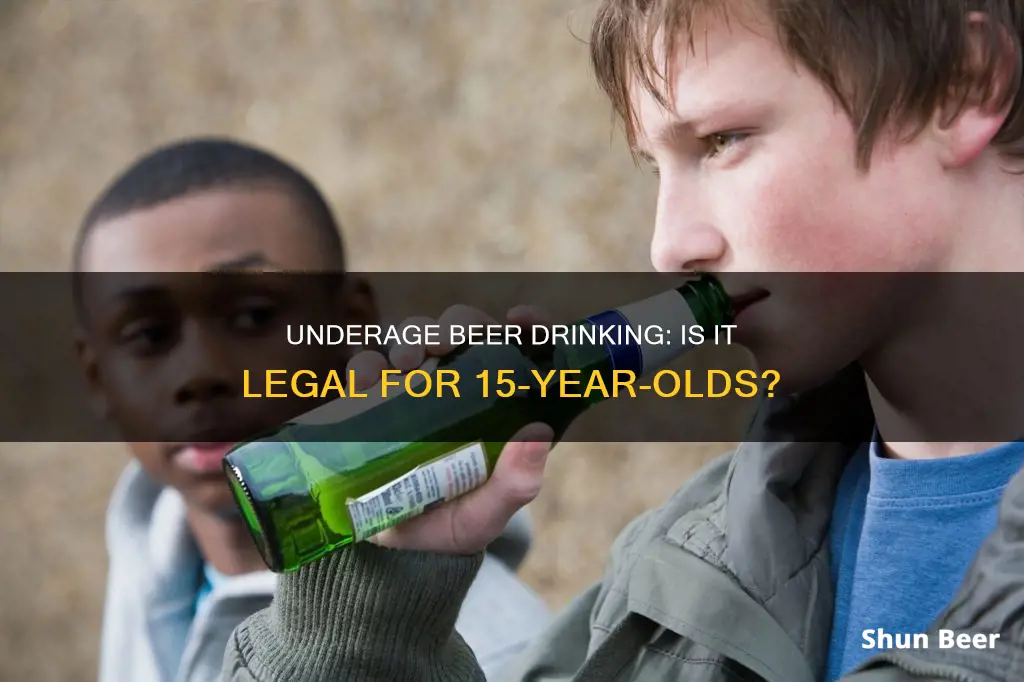
Alcohol consumption among youth is a serious public health concern, with far-reaching consequences for individuals, families, and society. Despite the decline in teenage drinking compared to previous generations, alcohol remains a leading contributor to death and illness among young people. In 2023, about 19.9% of 14 to 15-year-olds reported having consumed alcohol, and the act of drinking at such a young age can have detrimental effects on their health, safety, and overall well-being. This article will specifically address the question of whether 15-year-olds can drink beer and explore the potential risks associated with underage drinking.
| Characteristics | Values |
|---|---|
| Drinking beer as a 15-year-old | Drinking alcohol at a young age can lead to health and safety risks. |
| Legal status of drinking beer as a 15-year-old | It is illegal for a 15-year-old to drink beer in public in the UK and US. |
| Health effects of drinking beer as a 15-year-old | Drinking alcohol at a young age can lead to brain development issues and an increased risk of alcohol use disorder later in life. |
| Parental guidance on drinking beer as a 15-year-old | Parents play a key role in providing teens with the tools to make healthy life choices and are a main source of alcohol for teenagers. |
| Recommendations for parents | Not offering alcohol is best. If offered, a sip under supervision is less risky than a whole bottle or can. |
What You'll Learn

Drinking laws for 15-year-olds in the UK
In the UK, it is illegal for 15-year-olds to buy alcohol or be sold alcohol. The law states that it is illegal for someone under the age of 18 to buy alcohol or for an adult to buy alcohol for someone under 18. This applies across the UK in England, Scotland, Wales, and Northern Ireland.
In England, Scotland, and Wales, it is not illegal for someone between the ages of 5 and 17 to drink alcohol in a private place, such as their home. However, it is illegal for 15-year-olds to drink alcohol in a public place, such as a pub or restaurant. The police can stop, fine, or arrest anyone under 18 drinking in public and can confiscate alcohol from those under 18 or from anyone believed to be providing alcohol to those under 18.
The UK Chief Medical Officers recommend that an alcohol-free childhood is the healthiest option and that alcohol consumption by young people can be hazardous to their health. Alcohol consumption during adolescence can lead to acute alcohol poisoning, an increased risk of violence, and damage to developing organs such as the brain and liver. If 15-year-olds do consume alcohol, it should be limited to no more than one day a week and should always be under the guidance of a parent or carer or in a supervised environment.
Liquid Diets and Beer: Is It Allowed?
You may want to see also

Health risks of drinking beer at 15
In the United States, it is illegal to drink alcohol before the age of 21. However, underage drinking is a serious public health problem, with approximately 19.9% of 14 to 15-year-olds reporting having consumed alcohol in their lifetime.
Drinking beer at 15 can have several health risks and negative consequences. Firstly, it can cause many deaths, including from motor vehicle crashes, homicides, alcohol overdoses, falls, burns, drowning, and suicides. Alcohol impairs judgment and increases the likelihood of risky behaviours, such as drinking and driving, unsafe sexual behaviour, and aggressive or violent behaviour. Underage binge drinking is also associated with a higher chance of being a victim or perpetrator of interpersonal violence.
Drinking beer at 15 can also interfere with brain development, as people's brains continue to develop into their 20s. Alcohol consumption can alter brain structure and function, potentially causing cognitive or learning problems and increasing the vulnerability to developing an alcohol use disorder (AUD). Research shows that people who start drinking before the age of 15 are at a higher risk of AUD later in life.
In addition, drinking beer at 15 can cause health problems such as low blood sugar, blackouts, drowsiness, vomiting, and other serious issues. Long-term, heavy alcohol use can lead to many adverse health outcomes, including alcohol dependence, liver problems, and certain types of cancer.
Furthermore, drinking during puberty can disrupt normal hormone levels in the body, affecting growth and development. Alcohol consumption can also increase the risk of depression, anxiety, and low self-esteem.
Overall, the health risks of drinking beer at 15 are significant and can have both immediate and long-term negative consequences.
Beer Consumption: Weekly Safe Limits Explored
You may want to see also

Parental influence on teen drinking
While it is illegal for a 15-year-old to drink beer in most countries, some parents may allow their teenage children to consume alcohol at home or during meals at a restaurant. Parental influence on teen drinking can have both positive and negative effects.
Positive Influence
Authoritative parents who provide a healthy and consistent balance of discipline and support are more likely to have teenagers who respect the boundaries they have established around drinking. This parenting style, characterised by high levels of warmth, responsiveness, and appropriate discipline, has been linked to better outcomes for children in various areas, including body image, academic success, and lower substance misuse. Research suggests that adolescents are more likely to listen to their parents regarding issues such as drinking and smoking, especially when messages are conveyed consistently and with authority.
Negative Influence
On the other hand, problem drinking by parents can have adverse effects on adolescent development and adjustment. Inconsistent and unpredictable parenting behaviours due to alcohol consumption can undermine a child's sense of order and stability, leading to reduced self-esteem and self-competence. Parental alcohol abuse may also result in poorer monitoring of adolescent behaviours, such as drinking practices and curfews. Additionally, children of problem-drinking parents are at a higher risk for alcohol and drug use, as well as psychological problems.
Recommendations for Parents
To minimise the risk of their adolescents engaging in problematic drinking, parents can implement specific strategies. These include early and frequent age-appropriate conversations about alcohol, establishing clear rules and expectations, modelling responsible drinking behaviours, and working with other parents and the community to monitor adolescent activities and promote dialogue about underage drinking.
Kayaking and Beer: Is It Legal to Drink?
You may want to see also

Teen drinking culture in Australia
In Australia, the legal drinking age is 18. All states and territories prohibit people under this age from purchasing alcohol or consuming it in licensed premises or in public places. However, in most of the country, alcoholic beverages are defined as those with more than 1.15% alcohol by volume, but in Queensland and Victoria, this threshold is lowered to 0.5% alcohol by volume. This means that some low-alcohol beers and shandies are considered soft drinks in some parts of the country.
Despite the legal drinking age, teen drinking culture remains a notable aspect of Australian society. The media often portrays a narrative of a binge-drinking epidemic among young Australians, but this may be misleading. While teen drinking has historically been a common occurrence in Australia, data suggests that alcohol consumption among young people has been declining since the mid-2000s. According to the National Drug Strategy Household Survey, the proportion of 12- to 15-year-olds who drank alcohol in the past year decreased from 35% in 2004 to 18% in 2013. Similarly, drinking among 16- to 17-year-olds decreased from 81% to 59% during the same period. These trends are also reflected in the Australian Secondary Students Alcohol and Drug Survey, which showed a significant drop in drinking among 12- to 17-year-olds between 2002 and 2011.
Despite these positive trends, teen drinking remains a concern for many parents and guardians in Australia. The influence of peers and the desire to fit in can be strong motivators for teens to start drinking. Research has found that young people often feel pressured to conform to peer expectations around alcohol at parties and social events. They may also be concerned about social exclusion if they choose not to drink or do not drink to the same level of intoxication as their peers. This pressure to conform can make it challenging for teens to navigate social situations and make healthy choices regarding alcohol consumption.
To address these concerns, many Australian parents feel a sense of responsibility to educate their teenage children about alcohol and set rules and boundaries to keep them safe. While most parents do not supply their underage teenagers with alcohol, they may struggle with how to provide effective advice and strategies. Resources such as the DrinkWise website and professional health services can support parents in having these important conversations and establishing family rules around alcohol.
Building Muscle and Drinking Beer: Is It Possible?
You may want to see also

How to prevent underage drinking
In the UK, it is illegal for 15-year-olds to drink beer or any other form of alcohol in public. While it is not illegal for a child aged 5 to 17 to drink alcohol at home or on other private premises, it is strongly advised against. Alcohol consumption in the home is unregulated, and all experts recommend an alcohol-free childhood to prevent underage drinking.
Be a Positive Adult Role Model
It is important to stay away from alcohol in high-risk situations. For example, do not operate a vehicle after drinking alcohol, and do not give alcohol to your children. Inform them that any alcohol in your home is off-limits to them and their friends. Lead by example, and if you are struggling to control your drinking, seek support.
Be Involved in Your Child's Life
Encourage your child's growing independence, but set appropriate limits. Make it easy for your children to share information about their lives. Know where your children are, what they are doing, who they are with, and who their friends are. Get to know the parents of your children's friends and share your rules about not allowing alcohol use.
Set Clear Rules and Boundaries
Establish clear rules about alcohol use and enforce them. Help your children find fun alternatives to drinking. Do not let them attend parties where alcohol is served, and do not allow alcohol at parties in your own home.
Educate Your Child About the Risks of Alcohol
Start conversations about alcohol before your child becomes a teenager. Reassure them that it is fine to say no to alcohol. Make sure you have clear ground rules that you both agree on and stick to them. Talk to other parents and ensure they understand your stance on alcohol.
Work With Schools and Communities
Collaborate with schools, communities, and the government to protect children from underage alcohol use. Ensure that schools and the community support and reward young people's decisions not to drink. Establish rules about underage drinking at home, school, and in the community, and consistently apply them.
Beer and Iodine: Safe Drinking Post-CT Scan?
You may want to see also
Frequently asked questions
No, it is not recommended for 15-year-olds to drink beer or any other type of alcohol. In fact, according to experts, an alcohol-free childhood is advised, and underage drinking can lead to several health and safety risks.
Underage drinking can cause acute alcohol poisoning, low blood sugar, seizures, injuries, aggression, violence, and vulnerability to dangerous situations. Regular drinking at a young age can also lead to permanent brain and liver damage and negatively impact educational attainment.
Parents play a crucial role in providing teens with the tools to make healthy life choices. They should not supply alcohol to anyone under the age of 18 and model positive alcohol behaviours themselves, such as sticking to recommended drinking limits.







